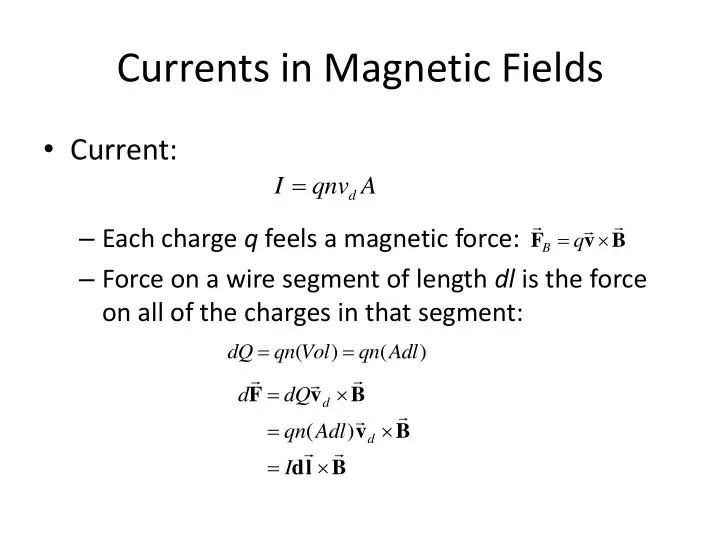

Currents in Magnetic Fields • Current: I qnv A d – Each charge q feels a magnetic force: F q v B B – Force on a wire segment of length dl is the force on all of the charges in that segment: dQ qn Vol ( ) qn Adl ( ) d F dQ v B d qn Adl ( ) v B d I dl B
Electrostatic Equilibrium • The charges in a conductor in electrostatic equilibrium have stopped moving. – E = 0 throughout a conductor in electrostatic equilibrium.
Conductors in Motion (in a B field) • Motional emf – Drag conductor through B field at constant velocity. – Charges rearrange until they achieve electrodynamic equilibrium • total force on charges is zero.
Hall Effect I qnv A d • Current to the left could be – Positive charges moving to the left. – Negative charges moving to the right. • Applying a B field perpendicular to the current flow allows us to discriminate between these two possibilities.
Hall Effect Figure 27.32
A current I passes through a slab of metal in the presence of a magnetic field B . Between which two sides does a Hall voltage develop? Put the side with the higher potential first. 1) a and b B e 2) c and d d I a 3) e and f b c 4) b and a f 5) d and c .
I
Field Lines Hall Sensor Current
4 0.8 1 10 0.6 8000 0.4 6000 0.2 4000 0 2000 -0.2 0 4 4 4 4 4 0 1 10 2 10 3 10 4 10 5 10 Magnetic Field (Oe)
Quantum Hall Effect Klaus von Klitzing et al., 1980 Nobel Prize: 1985
Current Loop in B field http://helios.augustana.edu/~dr/203/img/F28_20.jpg
Figure 27.22c
Recommend
More recommend